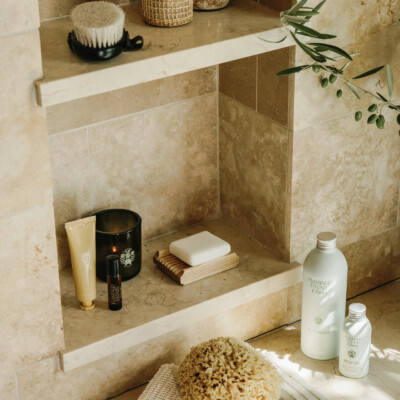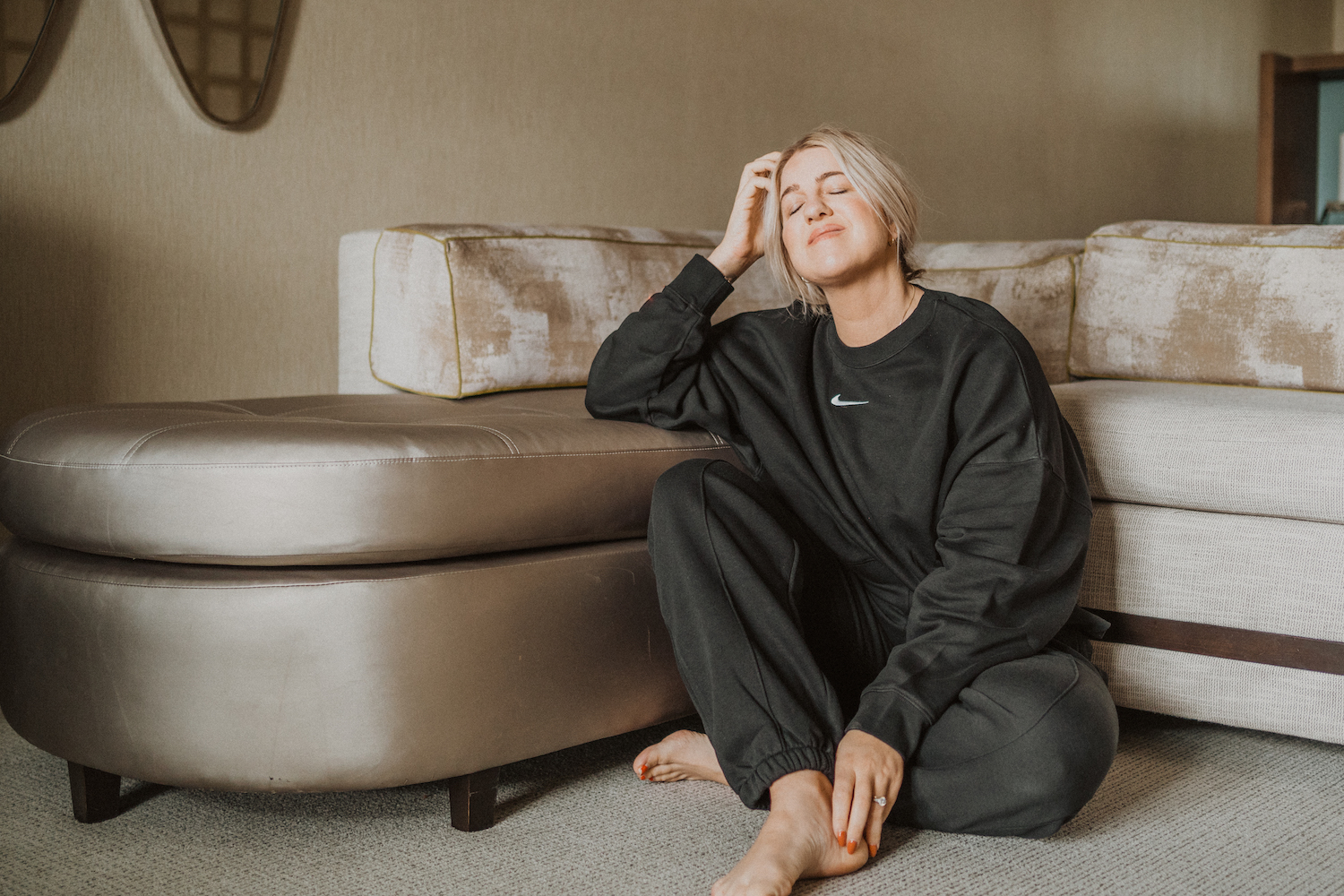Author, educator, entrepreneur, and podcaster Robyn Conley Downs is a woman on a mission: to help people feel good. Believing that small, simple shifts in thinking and action create big change in life, she leverages the power of psychology, neuroscience and mindfulness to help people find more calm, clarity and joy in their everyday lives.
After years of struggling and striving in her own life, tired of feeling burned out and behind, Robyn finally realized there had to be a simpler, more sustainable way to wellness. She founded Real Food Whole Life to help people redefine wellness on their terms through her unique blend of habit and mindset shifts.
“I want to help you cut through the clutter to uncover the small shifts that will make huge change in your life. I’ll help you unlock a collection of small mindset & habit shifts so you can find more calm, clarity, and joy everyday. Less striving. More ease. It’s time to feel good,” she says.
Robyn wrote The Feel Good Effect as a radically simple guide for sustainable wellness, with easy, customizable habits for happiness and health in mind, body, and soul. The perfect antidote to stress and burnout, it was published this year and could not come at a better time. Offering a refreshingly sane approach to change, her book helps you to identify and focus on the elements that will actually move the needle in your life. Scroll on for an excerpt…

Have you ever found yourself sucked into the comparison spiral? Maybe it’s scrolling social media, perusing Pinterest, or simply hanging out with friends, you’re going about your business, and then BAM, suddenly you find yourself in that all-too-familiar spiral. The thing is, comparison happens to the best of us and even though it feels terrible, it can seem like an impossible habit to quit.
The question then is, if it feels so bad, why do we keep doing it?
As Humans, We’re Wired to Compare
It turns out, social comparison is a natural part of our brain’s wiring. In fact, research shows that our brains are basically hard-wired to relate information about other people to ourselves. It’s actually one of the main main ways humans learn, and can help us avoid repeating the mistakes of others. There’s even research that shows that the brain’s reward center lights up not just when you perform well, but when you perform better than others. This hardwiring for comparison influences everything from our motivations, to how we act, the way we think about ourselves, and ultimately how we feel.
But even though our brains seem to have developed comparison as a way to help us, in our modern world it’s doing anything but. The problem is, when left unchecked, comparison can quickly get out of control. Especially when we have so many more opportunities to compare ourselves on a daily basis (hello, social media), the comparison spiral can be relentless and result in some pretty serious consequences. In fact, research shows that comparison is a direct contributor to feelings of inadequacy, guilt, shame, and general unhappiness. But you probably already knew that.
Toxic Comparison
I call this inadequacy-guilt-shame-unhappiness comparison cycle toxic comparison. It’s when comparison goes over the line, from being a source of inspiration to one of devastation, which makes it so damaging because it keeps you from embracing your own uniqueness and living your best life. Especially if you’re trying to start something new, toxic comparison leads you to believe that you’re not doing a good enough job right now, because there’s always someone out there doing it better. Toxic comparison is also a big troublemaker when it comes to body image. There’s a strong relationship in the research between comparison and body dissatisfaction, so basically comparison is a one-way ticket to feeling like crap about that beautiful body of yours.
So if the brain is naturally hard wired toward comparison and we’re faced with so many opportunities to compare each day, what’s a person to do? The stunningly simple answer: gratitude. Now I’m guessing that you’re probably already familiar with the many benefits of gratitude, as it has entered our collective consciousness in a major way. There truly are so many benefits, and if you’ve already incorporated some kind of gratitude practice into your life you know just how effective it can be. One of the major, and little-known, benefits of gratitude is that it provides a direct way out of toxic comparison, allowing you to better see the big picture and appreciate all the goodness that exists in your life at this moment.
 image by lindsay marcella via le fashion
image by lindsay marcella via le fashion
Misunderstanding Gratitude
But while gratitude is completely amazing, it’s also one of those concepts that seems to be a bit misunderstood. There’s a common misconception floating around right now that you can’t feel gratitude and anxiety at the same time. While I completely understand the spirit of this idea–gratitude has been shown to reduce feelings of anxiety–you can, of course, feel more than one thing at the same time. I like to think instead of gratitude interrupting anxiety, or providing an alternate way of thinking that allows for pause so you can reframe and refocus.
The great thing is that practicing gratitude doesn’t require that you feel grateful one hundred percent of the time. It doesn’t require that you never feel sad, or down, or disappointed. It doesn’t mean seeing the world with rose colored glasses, or ignoring the serious issues and challenges in the world. Nor does it mean ignoring the challenging circumstances in your life. Practicing gratitude is instead simply about training your brain to see the goodness within the tough, difficult, sometimes draining aspects of everyday life. It’s a powerful way to rewire your brain to see the reality or full picture, instead of just focusing on the negative, or ways you don’t seem to measure up compared to someone else.
Negativity Bias
In truth, seeing the negative is another thing that’s hardwired into our brains. It’s called negativity bias, a natural instinct to identify threat and danger all around us, another one of those things that probably developed to keep us safe from real danger. Think about it: in ancient times if you were constantly on alert, looking for threats, you were more likely to survive. You wouldn’t get eaten by the lion, because you were vigilantly on the lookout.
The problem is, these days our brains are hyper aware of threats that aren’t really all that dangerous. Negativity bias is the reason that one rude comment you receive on social media stands out far more than the dozens of positive ones. And it’s the reason that all the things that went wrong during the day pop into your head right before you fall asleep, instead of thinking of any of the good things that happened. Negativity bias is highly related to toxic comparison because it causes you to over-focus on the bad, stressful, or threatening things in daily life, instead of seeing the full reality of the situation. That’s exactly what makes it sneaky– it gives so much weight to the bad things that it causes you to miss much of the good.
The Power of Positivity Bias
This is where gratitude comes into play. Research has shown that people who practice gratitude experience more joy, hope, and love in life, regardless of their individual experiences. They also experience fewer negative emotions like envy, greed, and resentment. A consistent gratitude practice has also been shown to help lessen depression for people with chronic health problems, and has been linked with increased feelings of trust and empathy, connection, satisfaction, and commitment in friendships, romantic relationships, and marriages. So yeah. It’s that good.
This is why gratitude can be such a game-changer when it comes to comparison, as it neutralizes negativity bias, allowing you to see beyond immediate threats and experience to see more of the full story. Practicing gratitude essentially creates a positivity bias, one that allows you to see a fuller picture of your experience–the negative and the positive–as well as knowing that your worth and value has nothing to do with anyone else. Or really, gratitude creates a reality bias, one that’s grounded in the full spectrum of what is real, both the good and the bad. So the next time you feel the comparison spiral start to set in, stop, drop, and gratitude .
Step Out of Comparison with This Simple Gratitude Practice
Shifting your mindset away from comparison and into gratitude can happen through the addition of simple gratitude practices into your daily routine. Try this gratitude practice when you feel toxic comparison setting in.
What: Capture small moments of gratitude using the camera on your phone. Then create a gratitude file on your phone for the images.
When: Daily. Consider setting an alarm on your phone for a certain time of day, then take a photo at that time.
How: Challenge yourself to capture at least one photo per day. If you’re feeling stuck, look for tiny details. Return to the file whenever toxic comparison pops up, or to get a fuller picture of all the goodness in your life.









